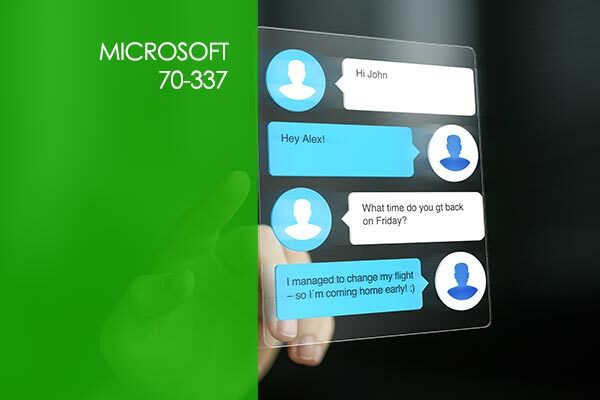Microsoft 70-337: MCSE Communication – Lync Server
If you are an IT or telecoms consultant, this Microsoft 70-337: MCSE Communication – Lync Server exam is ideal for you! It will equip you with the knowledge and skills to successfully translate a client’s business requirements into a detailed technical architecture and design of unified communications (UC) solutions. With your proficiency in implementing these UC systems, clients can trust that their needs are being fulfilled efficiently and effectively.
Included In This Course



Closed Captions



Certificate of Completion
Course Description for Microsoft 70-337: MCSE: Communication – Lync Server
The “Microsoft 70-337: MCSE: Communication – Lync Server” course is a comprehensive guide to mastering the Lync Server, an essential tool for unified communication in enterprise environments. This course covers all key aspects of Lync Server architecture, configuration, and integration, providing in-depth knowledge and practical skills needed for effective deployment and management.
Participants will learn about voice architecture, enterprise voice functionality, and the integration of Lync with Exchange Server 2013 for unified messaging. The course also delves into advanced topics such as configuring voice applications, emergency calling, PSTN integration, and networking for Lync Server 2013. Additionally, students will explore device deployment and management, online migration, and monitoring for optimal performance and resilience.
What You Will Learn in Microsoft 70-337: MCSE: Communication – Lync Server
This course is designed to equip learners with the skills and knowledge required to effectively manage and deploy Lync Server in a professional setting. By the end of the course, you will have a thorough understanding of:
- Voice architecture and server roles
- Configuring enterprise voice functionalities
- Integrating Lync with Exchange Server 2013 for unified messaging
- Implementing and managing voice applications
- Deploying emergency calling solutions
- Integrating Lync with PSTN and existing PBX systems
- Planning and managing media requirements and call admission control
- Deploying and managing Lync-compatible phones and devices
- Migrating to Lync Online and managing hybrid scenarios
- Monitoring voice quality and server performance
- Ensuring Lync Server voice resiliency and disaster recovery
Exam Objectives for Microsoft 70-337: MCSE: Communication – Lync Server Certification
The Microsoft 70-337 certification exam evaluates your ability to configure and manage a Lync Server environment. The key objectives of the exam include:
- Understanding Lync Server architecture and deployment
- Configuring Lync Server for enterprise voice and messaging
- Integrating Lync Server with Exchange Server and PSTN
- Managing and deploying Lync Server devices and applications
- Monitoring and maintaining Lync Server performance
- Ensuring high availability and disaster recovery for Lync Server
Who This Microsoft 70-337: MCSE: Communication – Lync Server Course is For
This course is ideal for IT professionals and system administrators who are responsible for managing unified communication systems within their organizations. It is also beneficial for:
- Network engineers and architects
- Telecommunications professionals
- IT consultants specializing in Microsoft technologies
- Individuals seeking MCSE certification
- Professionals looking to enhance their skills in enterprise voice solutions
Possible Jobs You Can Get With Microsoft 70-337: MCSE: Communication – Lync Server Knowledge
Completing this course and earning the Microsoft 70-337 certification opens up various career opportunities in the IT and telecommunications sectors. Potential job titles include:
- Unified Communications Engineer
- Systems Administrator
- Network Engineer
- IT Consultant
- Telecommunications Specialist
- Technical Support Engineer
Average Industry Salaries for People with Microsoft 70-337: MCSE: Communication – Lync Server Skills
Professionals with expertise in Lync Server and unified communications can expect competitive salaries. The average salary ranges for relevant positions are:
- Unified Communications Engineer: $80,000 – $120,000 per year
- Systems Administrator: $70,000 – $110,000 per year
- Network Engineer: $75,000 – $115,000 per year
- IT Consultant: $85,000 – $130,000 per year
- Telecommunications Specialist: $65,000 – $105,000 per year
Get Started Today with Microsoft 70-337: MCSE: Communication – Lync Server
Enroll in the “Microsoft 70-337: MCSE: Communication – Lync Server” course today and take the first step towards mastering Lync Server for your organization’s unified communication needs. Gain the knowledge and skills to excel in your career and achieve the Microsoft 70-337 certification. Start now and transform your professional capabilities!
To see more Microsoft related training, Visit the Microsoft Website.
Frequently Asked Questions About Microsoft 70-337: MCSE Communication – Lync Server
What is the Microsoft 70-337: MCSE: Communication – Lync Server course?
The Microsoft 70-337: MCSE: Communication – Lync Server course is designed to provide comprehensive knowledge and practical skills for managing and deploying Lync Server. It covers voice architecture, enterprise voice functionality, integration with Exchange Server 2013, voice applications, emergency calling, PSTN integration, networking, devices, online migration, monitoring, and voice resiliency.
Who should take the Microsoft 70-337: MCSE: Communication – Lync Server course?
This course is ideal for IT professionals, system administrators, network engineers, telecommunications professionals, IT consultants specializing in Microsoft technologies, individuals seeking MCSE certification, and professionals looking to enhance their skills in enterprise voice solutions.
What are the key topics covered in the Microsoft 70-337: MCSE: Communication – Lync Server course?
The course covers various key topics, including voice architecture and server roles, configuring enterprise voice functionalities, integrating Lync with Exchange Server 2013, implementing voice applications, deploying emergency calling, integrating with PSTN, planning media requirements, deploying devices, migrating to Lync Online, monitoring server performance, and ensuring voice resiliency.
What are the exam objectives for the Microsoft 70-337 certification?
The exam objectives include understanding Lync Server architecture and deployment, configuring enterprise voice and messaging, integrating Lync Server with Exchange Server and PSTN, managing devices and applications, monitoring server performance, and ensuring high availability and disaster recovery.
What career opportunities can I pursue with the Microsoft 70-337 certification?
With the Microsoft 70-337 certification, you can pursue various career opportunities, including roles as a Unified Communications Engineer, Systems Administrator, Network Engineer, IT Consultant, Telecommunications Specialist, and Technical Support Engineer.
Proudly DisplayYour Achievement
Upon completion of your training, you’ll receive a personalized certificate of completion to help validate to others your new skills.
Microsoft 70-337: MCSE: Communication - Lync Server Course Content
Module 1: Understanding Voice Architecture
- Course Introduction
- Introduction To Architecture And Server Roles - Part 1
- Introduction To Architecture And Server Roles - Part 2
- Introduction To Architecture And Server Roles - Part 3
- Introduction To Architecture And Server Roles - Part 4
- Introduction To Architecture And Server Roles - Part 5
Module 2: Configuring Key Enterprise Voice Functionality
- Introduction To Lync Voice Routing
- Configure Enterprise Voice - Part 1
- Configure Enterprise Voice - Part 2
- Configure Enterprise Voice - Part 3
- Define Voice Policies - Part 1
- Define Voice Policies - Part 2
Module 3: Designing Exchange Server 2013 Unified Messaging Intergration with Lync Server 2013
- Introduction To Exchange 2013 Unified Messaging - Part 1
- Introduction To Exchange 2013 Unified Messaging - Part 2
- Configure Exchange UM To Work With Lync 2013 - Part 1
- Configure Exchange UM To Work With Lync 2013 - Part 2
- Configure Exchange UM To Work With Lync 2013 - Part 3
- Configure Exchange UM To Work With Lync 2013 - Part 4
- Configuring Exchange And Lync Feature Integration - Part 1
- Configuring Exchange And Lync Feature Integration - Part 2
- Configuring Exchange And Lync Feature Integration - Part 3
- Configuring Exchange And Lync Feature Integration - Part 4
- Configuring Exchange And Lync Feature Integration - Part 5
Module 4: Understanding Voice Applications
- Introduction To Response Group Services - Part 1
- Introduction To Response Group Services - Part 2
- Introduction To Response Group Services - Part 3
- Introduction To Response Group Services - Part 4
Module 5: Configuring and Deploying Emergency Calling
- Introduction To Location Information Server - Part 1
- Introduction To Location Information Server - Part 2
- Introduction To Set Up And Call Flow - Part 1
- Introduction To Set Up And Call Flow - Part 2
- E911 User Experience
Module 6: Integrating the PSTN
- Connect To The PSTN - Part 1
- Connect To The PSTN - Part 2
- Connect To The PSTN - Part 3
- Connect To The Existing PBX
- Intro To M-N Interworking Routing
- Introduction To Call Routing Reliability
Module 7: Understanding Lync Server 2013 and Networking
- Plan For Media Requirements - Part 1
- Plan For Media Requirements - Part 2
- Plan For Call Admission Control - Part 1
- Plan For Call Admission Control - Part 2
- Introduction To Media Bypass
Module 8: Understanding Phones and Devices
- Introduction To Phones And Devices Deploy Device - Part 1
- Introduction To Phones And Devices Deploy Device - Part 2
- Introduction To Phones And Devices Deploy Device - Part 3
- Lync Server 2013 Phones Management - Part 1
- Lync Server 2013 Phones Management - Part 2
Module 9: Configuring And Migrating Lync Online
- Introduction To Office 365 Architecture
- Deploy Lync Online
- Introduction To Lyncy brid Scenerios
Module 10: Monitoring
- Introduction To Voice Quality Concepts
- Explore Lync Monitoring Server Components
- Explore Lync Monitoring Server Reports
Module 11: Understanding Lync Server2013 Voice Resiliency
- Introduction To Voice Resilience
- Introduction Lync Pool Resilience
- Introduction Branch Office Resilience
- Course Outro
Your Training Instructor
Chrys Thorsen is an education and technology expert who specializes in enterprise-level IT infrastructure consulting and certified training-of-trainers. In her career, she has garnered over 50 IT Certifications including CISSP, CISA, CEHv12, PenTest+, CompTIA CNVP, Cisco CCSI/CCNP, Microsoft Cloud and on-premises technologies, VMware vSphere, and many more. She has also authored 40 published certification textbooks, and over 35 full-length IT certification video courses.
When not working in the United States, Chrys spends her time abroad capacity-building IT literacy in developing nations in Sub-Saharan Africa. Her client list has included: the US Federal Government, the Republic of Zambia Ministry of Health, Cavendish University Zambia, Accenture, JP Morgan Chase, the US Centers for Disease Control and Prevention, the Elizabeth Glaser Pediatric AIDS Foundation (EGPAF), Hughes Aircraft, Microsoft, and many more.
Chrys lives by, and is fond of repeating, her professional creed:
“The only true measure of success for any project or training is results on the ground. Everything else is just noise.” “I teach what I deploy; I deploy what I teach.”

Subscribe To All-Access
Lock In $16.99 / Month Forever
Access this course and over 2,700 hours of focused IT training. Start your first month for only $1.00. Then lock in only $16.99 / month for life.
- Get Every Course
- Free Updates / New Content Added
- 2,700+ Hours of Training
- Price Lock Guarantee
- Games / Flashcards
- 21,000+ Practice Questions
$49.99 $16.99 Monthly
$49.00

 ITU Online
ITU Online


